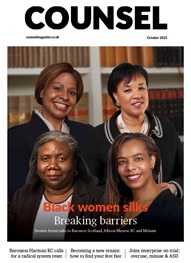*/
Work is continuing on the Bar’s proposed self-funding civil justice scheme to “deal with nuts and bolts” ahead of Lord Justice Jackson’s final recommendations on litigation costs.
The Contingent Legal Aid Fund (“CLAF”) would be a self-financing pool of money used for civil claims where legal aid money was not available. Investors in the pool could see a return on their money.
Guy Mansfield QC, who is leading the group developing the CLAF, said they were looking at how it would be constructed in terms of legislation, how they would fund someone to run it, how they would manage costs, case selection criteria, and how much money would be needed up front. Mansfield emphasised the fund “should not be seen as a Trojan horse to take legal aid away from other cases” and would be an addition to, not a substitute for, legal aid funding.
However, the fund will not work if conditional fee arrangements (“CFAs”) continue in their present form. Lord Justice Jackson has hinted he may propose changes to the CFA regime when he delivers his recommendations, expected in December. In May 2009 Lord Justice Jackson published his preliminary report in his Review of Civil Litigation Costs. The report stated: “Following the retraction of legal aid, either CFAs or some other system of payment by results (contingent fee agreements, CLAF, SLAS, third party funding agreements etc) must exist in order to facilitate access to justice.”
The Contingent Legal Aid Fund (“CLAF”) would be a self-financing pool of money used for civil claims where legal aid money was not available. Investors in the pool could see a return on their money.
Guy Mansfield QC, who is leading the group developing the CLAF, said they were looking at how it would be constructed in terms of legislation, how they would fund someone to run it, how they would manage costs, case selection criteria, and how much money would be needed up front. Mansfield emphasised the fund “should not be seen as a Trojan horse to take legal aid away from other cases” and would be an addition to, not a substitute for, legal aid funding.
However, the fund will not work if conditional fee arrangements (“CFAs”) continue in their present form. Lord Justice Jackson has hinted he may propose changes to the CFA regime when he delivers his recommendations, expected in December. In May 2009 Lord Justice Jackson published his preliminary report in his Review of Civil Litigation Costs. The report stated: “Following the retraction of legal aid, either CFAs or some other system of payment by results (contingent fee agreements, CLAF, SLAS, third party funding agreements etc) must exist in order to facilitate access to justice.”
Work is continuing on the Bar’s proposed self-funding civil justice scheme to “deal with nuts and bolts” ahead of Lord Justice Jackson’s final recommendations on litigation costs.


Justice system requires urgent attention and next steps on the Harman Review
Q&A with Tim Lynch of Jordan Lynch Private Finance
By Marie Law, Director of Toxicology at AlphaBiolabs
By Louise Crush of Westgate Wealth Management
Why Virtual Assistants Can Meet the Legal Profession’s Exacting Standards
Six months of court observation at the Old Bailey: APPEAL’s Dr Nisha Waller and Tehreem Sultan report their findings on prosecution practices under joint enterprise
The Amazonian artist’s first international solo exhibition is wholly relevant to current issues in social and environmental justice, says Stephen Cragg KC
Despite its prevalence, autism spectrum disorder remains poorly understood in the criminal justice system. Does Alex Henry’s joint enterprise conviction expose the need to audit prisons? asks Dr Felicity Gerry KC
Until reforms are instituted and a programme of training is introduced, expert opinion on intimate partner abuse remains vital to realigning the tilted scales of law and justice, writes Professor Susan Edwards
It’s been five years since the groundbreaking QC competition in which six Black women barristers, including the 2025 Chair of the Bar, took silk. Yet today, the number of Black KCs remains ‘critically low’. Desirée Artesi talks to Baroness Scotland KC, Allison Munroe KC and Melanie Simpson KC about the critical success factors, barriers and ideas for embedding change